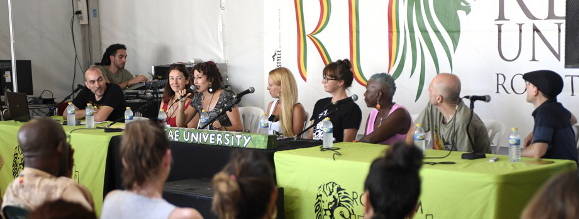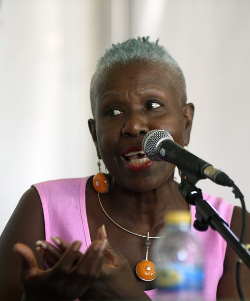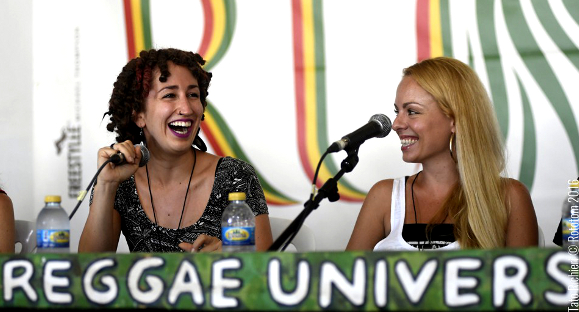Articles about reggae music, reviews, interviews, reports and more...
Gal a Bubble - Female Empowerment or Objectification in Dancehall?

Gal a Bubble - Female Empowerment or Objectification in Dancehall?
Rototom Sunsplash Reggae University Day 2.

Day two of the Reggae University continued a theme touched on in the previous day's Content or Hype discussion - the often polarised view of female agency in dancehall. This time the focus was on the dancers themselves. Returning as a guest was Professor Carolyn Cooper of the University of the West Indies, alongside US filmmaker Cori McKenna, 2010 German dancehall queen Swaggi Maggi and 2007/2014 Italian queen Alevanille. Before the talk the University screened McKenna's film: Bruk Out - A Dancehall Queen documentary (in which Alevanille had a starring role).
Riddim magazine’s Pete Lilly chaired the panel, asking McKenna, who had financed her project using crowdfunding and her income at HBO, why she chose this subject. “When I first saw dancehall queens as an outsider they were just objects to me” she said frankly “I wanted to meet them as people”.
Lilly’s Riddim colleague Ellen Koehlings drew attention to the controversial opening of the film where a little girl performs suggestive dance moves. McKenna agreed that it confronted Eurocentric stereotypes. “White American males were turned off by a little girl dancing.”
 Professor Cooper, who had repeatedly placed female sexuality front and centre in conversation a day earlier, disagreed. “I felt discomfort with the opening. I felt she was exposed in problematic way.” Yet she also praised the documentary saying “Despite my reservations I found the film empowering. The sheer joy of the body is emancipatory. Christians say flesh is sinful but if you engage in dance you will feel that freedom.”
Professor Cooper, who had repeatedly placed female sexuality front and centre in conversation a day earlier, disagreed. “I felt discomfort with the opening. I felt she was exposed in problematic way.” Yet she also praised the documentary saying “Despite my reservations I found the film empowering. The sheer joy of the body is emancipatory. Christians say flesh is sinful but if you engage in dance you will feel that freedom.”
The two European dancers explained their motivations for getting involved in the culture. Swaggi Maggi started to going to parties in Germany, learning moves and lyrics from YouTube. Alevanille had a background in other forms of dance, but was inspired by the 2006 movie Dancehall Queen. “No one was doing this in Italy. I went to Jamaica and it was magic. When I start to use this dance I really felt free. I could express any emotion. Not just sensuality but comedy, aggression”. Maggi added that when she first went to Jamaica she was surprised to discover most Kingston dancers were men. She initially struggled to gain acceptance until she learned how to do the male dance styles.
Professor Cooper asked if male dance routines were more respected. Maggi answered that in Jamaica both were respected but in Europe female styles were “too provocative – they don’t see the entertainment part”.
Both dancers organise regular trips to Jamaica to teach European students. Maggi observed that the rise of dance tourism meant that where before dancing was purely from the streets, two studios had opened. “So what you’re saying is Jamaicans are imitating their imitators?” prodded Cooper. “I would say influence” ventured Maggi. “I’m just teasing you!” laughed the professor, “Really I admire you guys who do it professionally to add value to your imitations”.

Regular panellist David Katz made a comparison to musical exchanges between Jamaica and overseas. Cooper partially agreed but insisted that “influences create something distinctively Jamaican that can be copied”. She qualified this by stating: “Jamaicans welcome foreigners who excel at our cultural forms.”
When questions opened to the audience, Dr Dennis Howard, again front row, informed that Jamaican dance culture did not appear from nowhere in the 1990s. He recounted the rich history of dancing going back to the ska days of Persian the Cat and Sparky & Pluggy. However, women dancing alone was unheard of in those days. He stood and up to dispel the notion that sexually explicit slackness was a late innovation. “Every artist from Jamaica had a dutty song. Bob had Guava Jelly. The mento tune Night Food (by Chin’s Calypso Quintet and Bedasse) was banned.”
A youth worker at the back voiced a concern that young vulnerable women are influenced by powerful sexuality to put themselves in danger of psychological issues and abuse. “This is a very sensitive issue” said Professor Cooper “This is why we should have these conversations about music and performance. Remember Lady Saw is an actress - don't mix up performance with reality. On stage you have the distance.”
Read more about this topic
Comments actually desactivated due to too much spams
Browse by categories
Recommended Articles
Latest articles
Recently addedView all
© 2007-2026 United Reggae. All Rights Reserved. Reproduction in whole or in part is prohibited. Read about copyright
Terms of use | About us | Contact us | Authors | Newsletter | A-Z














